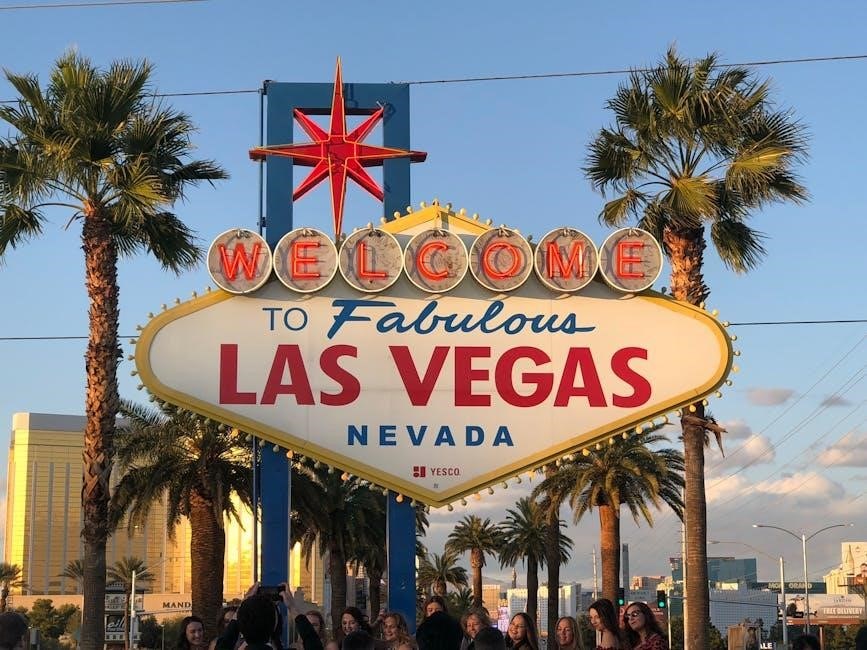
Hunter S. Thompson’s iconic novel blends Gonzo journalism with a chaotic journey to Las Vegas, exploring drug culture, the American Dream, and societal critique.
Overview of the Book
Fear and Loathing in Las Vegas is Hunter S. Thompson’s seminal work of Gonzo journalism, blending fiction and reality. The story follows a journalist and his attorney on a drug-fueled trip to Las Vegas, ostensibly to cover the Mint 400 race. The novel explores themes of the American Dream, excess, and societal decay, delivered through a chaotic and surreal narrative. The book’s unique style, combining humor, satire, and philosophical musings, has made it a cult classic. Its exploration of drug culture and moral ambiguity continues to resonate, offering a provocative critique of 1970s America. The 50th-anniversary edition includes an introduction by Caity Weaver.
The Author: Hunter S. Thompson
Hunter S. Thompson was a pioneering American journalist and novelist, best known for his unique Gonzo journalism style, which immerses the writer in the story. Born in 1937, Thompson gained fame with Fear and Loathing in Las Vegas, a semi-autobiographical account of a drug-fueled journey. His work often critiques American culture and politics, blending humor with sharp societal observations. Thompson’s influence extends beyond literature, impacting journalism and pop culture. His legacy endures through adaptations of his work, including the 1998 film starring Johnny Depp, cementing his status as a literary icon and cultural figure.
The Journey to Las Vegas
The journey to Las Vegas in Fear and Loathing in Las Vegas is a chaotic, drug-fueled adventure undertaken by the narrator and his attorney. The trip begins with a rented car loaded with drugs and alcohol, setting the tone for the surreal events that follow. Along the way, they encounter a nervous hitchhiker whose reaction to their drug use adds to the tension. The journey serves as a catalyst for exploring themes of excess, madness, and the American Dream, with Thompson’s vivid descriptions creating a sense of immersion and heightened reality.

Themes and Symbolism
Fear and Loathing in Las Vegas explores themes of the American Dream, Gonzo journalism, and drug culture, using vivid symbolism to critique societal excess and illusion.
The American Dream
The novel critiques the illusion of the American Dream, portraying it as unattainable and corrupted by consumerism. Through the characters’ chaotic journey, Thompson exposes the dark underbelly of materialism and societal expectations, highlighting how the pursuit of happiness often leads to disillusionment and moral decay. The excesses of Las Vegas serve as a backdrop, symbolizing the false promises of wealth and pleasure. The narrative challenges the notion of a perfect, prosperous life, instead revealing a fragmented society grappling with identity and purpose, making it a powerful commentary on America’s cultural and political landscape during the late 20th century.
Gonzo Journalism
Gonzo journalism, pioneered by Hunter S. Thompson, blurs the line between reporter and participant. In Fear and Loathing in Las Vegas, Thompson immerses himself in the story, creating a subjective, first-person narrative. This unconventional approach rejects traditional journalistic objectivity, offering a raw, personal account of events; The novel exemplifies Gonzo’s essence, combining factual reporting with fictional elements to convey the intensity of the experience. Thompson’s unique style captures the chaos and unpredictability of the journey, making the reader an active participant in the narrative. This approach has influenced modern journalism and storytelling, emphasizing authenticity over detachment.
Drug Culture and Its Effects
Fear and Loathing in Las Vegas vividly portrays the pervasive drug culture of the 1970s, with the narrator and his attorney consuming a wide array of substances; The novel highlights the effects of drugs on perception, decision-making, and reality. Through hallucinations, paranoia, and erratic behavior, Thompson illustrates the darker side of drug use, blending humor with cautionary insight. The narrative serves as both a critique and a reflection of the era’s countercultural movements, offering a candid look at the consequences of excessive drug consumption. This exploration remains a significant aspect of the book’s enduring relevance and cultural impact.

Plot Summary
The novel follows a journalist and his attorney on a chaotic trip to Las Vegas, blending journalism with surreal, drug-fueled experiences, exploring American culture and societal critique.
The Mint 400 Race
The Mint 400 race serves as the central event in Fear and Loathing in Las Vegas, a chaotic off-road motorcycle competition in the Nevada desert. The narrator and his attorney attend the race as part of their assignment, but their coverage quickly descends into madness. The race symbolizes the excess and unpredictability of American culture, while the narrator’s drug-fueled observations blur the line between reality and fantasy. The event becomes a backdrop for their surreal journey, reflecting Thompson’s critique of societal norms and the search for meaning in a chaotic world. The race’s significance extends beyond the story, embodying themes of rebellion and disillusionment.
The Attorney and the Narrator
The attorney and the narrator form a dynamic duo at the heart of Fear and Loathing in Las Vegas. The narrator, a journalist, and his attorney, Dr. Gonzo, embark on a drug-fueled journey to Las Vegas. Their relationship is marked by camaraderie and shared rebelliousness, but also by moments of tension and paranoia. The attorney’s brash confidence contrasts with the narrator’s introspective nature, creating a complex interplay. Together, they navigate a surreal world of excess, challenging societal norms and blurring the lines between reality and illusion. Their partnership drives the narrative’s exploration of the American Dream’s darker underbelly.
The Hitchhiker Encounter
A pivotal moment in Fear and Loathing in Las Vegas occurs when the narrator and his attorney pick up a hitchhiker en route to Las Vegas. The hitchhiker’s anxiety escalates as the duo’s drug-induced antics intensify, leading to a tense and memorable exchange. This encounter symbolizes the clash between the counterculture’s free-spirited nature and the mainstream’s naivety. The hitchhiker’s fear reflects the broader societal unease with the emerging drug culture of the 1970s. The scene underscores Thompson’s critique of American norms, blending humor with a darker commentary on the era’s cultural divide.

Cultural Impact
Fear and Loathing in Las Vegas has left a lasting mark on literature and popular culture, inspiring adaptations, influencing journalism, and symbolizing countercultural rebellion.
Influence on Journalism
Fear and Loathing in Las Vegas revolutionized journalism through Gonzo reporting, where the writer becomes part of the story. Thompson’s immersive, subjective style blurred fact and fiction, influencing countless journalists to embrace personal narrative and unconventional storytelling. His approach challenged traditional journalistic objectivity, creating a new wave of engaging, first-person reporting. The book’s success encouraged writers to experiment with narrative techniques, making Gonzo journalism a significant movement in literary journalism. Thompson’s work continues to inspire journalists and writers, proving the power of blending personal experience with cultural commentary to create compelling and unforgettable stories.
Adaptations and References
Fear and Loathing in Las Vegas has been widely adapted and referenced in popular culture. The 1998 film adaptation, directed by Terry Gilliam and starring Johnny Depp, brought the story to the screen, capturing its surreal and chaotic essence. The book has also been referenced in music, TV shows, and other films, solidifying its cultural impact. Additionally, the novel has inspired various formats, including audiobooks and PDF versions, making it accessible to a broad audience. Its iconic imagery and themes continue to influence creative works, ensuring its lasting relevance in modern media and entertainment.
Legacy in Pop Culture
Fear and Loathing in Las Vegas has left an indelible mark on pop culture. Its themes of rebellion and excess have inspired countless adaptations, from films to music. The 1998 movie starring Johnny Depp cemented its place in cinematic history. The book’s Gonzo journalism style has influenced writers and creators, while its iconic imagery, like the “Red Shark” car, has become synonymous with counterculture. PDF versions of the novel remain popular, allowing new generations to explore its chaotic journey. Its influence extends to art, music, and fashion, ensuring its legacy as a cultural touchstone of rebellion and free-spirited adventure.

PDF and Download Information
Fear and Loathing in Las Vegas is widely available as a PDF, with free downloads from platforms like Litres and royallib.com. The 50th-anniversary edition includes a foreword by Caity Weaver, offering fresh insights into Thompson’s seminal work. Readers can access the book in various formats, including TXT and PDF, ensuring easy readability on multiple devices. This accessibility has helped the novel maintain its cultural relevance, allowing new generations to explore its chaotic and thought-provoking narrative.
Legal Sources for the PDF
Legitimate PDF downloads of Fear and Loathing in Las Vegas are available through authorized platforms like Litres, Amazon, and royallib.com. These sites offer the book in formats such as PDF, EPUB, and FB2. Purchasing through these sources ensures compliance with copyright laws and supports the author’s legacy. Additionally, the 50th-anniversary edition, featuring an introduction by Caity Weaver, is available on Amazon and other reputable retailers. These legal sources provide high-quality versions of the novel, allowing readers to engage with Thompson’s iconic work ethically and conveniently.
Free Download Options
Several websites offer free PDF downloads of Fear and Loathing in Las Vegas, though users should verify their legality. Platforms like royallib.com and archive.org provide free access, but these may not always be authorized. Additionally, online forums and academic communities sometimes share PDF versions for educational purposes. However, downloading from unauthorized sources risks infringing on copyright laws. For a seamless experience, consider using platforms like Course Hero or ResearchGate, which offer study guides and excerpts legally. Always prioritize legal sources to ensure compliance and support the author’s work. Free options are available but require cautious navigation.
Formats Available
Fear and Loathing in Las Vegas is available in various digital formats, including PDF, EPUB, FB2, and TXT. The PDF version is widely sought after for its readability and offline accessibility. Many online platforms, such as Litres and royallib.com, offer these formats for download. Additionally, the 50th-anniversary edition includes special features like an introduction by Caity Weaver. Audiobook versions are also available for those who prefer listening. These formats ensure readers can engage with the book in their preferred medium, whether for study, leisure, or academic purposes. The versatility of formats makes the novel accessible to a broad audience.
Study Resources
Study guides, summaries, and PDF resources for Fear and Loathing in Las Vegas are available online, aiding students in analyzing themes, characters, and literary techniques effectively.
Study Guides and Summaries
Study guides and summaries for Fear and Loathing in Las Vegas are widely available online, offering detailed analyses of themes, characters, and plot. Platforms like Course Hero and LitCharts provide comprehensive resources, including PDF downloads, to aid students and researchers. These guides explore Thompson’s unique narrative style, the concept of Gonzo journalism, and the novel’s critique of the American Dream. Summaries often break down key events, such as the Mint 400 race and the hitchhiker encounter, while also examining the psychological and cultural implications of the characters’ drug-fueled journey. These resources are invaluable for deepening understanding of the novel’s complex themes.
PDF Study Guides
PDF study guides for Fear and Loathing in Las Vegas provide in-depth analysis, character insights, and thematic breakdowns. Available on platforms like Course Hero and LitCharts, these guides are downloadable for offline study. They often include summaries of key chapters, such as the Mint 400 race and the hitchhiker encounter, along with critical perspectives on Thompson’s Gonzo journalism style. These resources are designed to enhance understanding of the novel’s exploration of the American Dream, drug culture, and societal critique. PDF guides are particularly useful for researchers and students seeking a concise yet comprehensive analysis of Thompson’s seminal work.
Online Reviews and Analysis
Online reviews and analyses of Fear and Loathing in Las Vegas offer diverse perspectives on its themes and literary significance. Platforms like ResearchGate and LitCharts provide detailed studies, including neo-Aristotelian analyses of the novel’s structure and themes. Reviews highlight Thompson’s Gonzo journalism style, blending fact and fiction, and its critique of American culture. Scholarly articles explore the novel’s exploration of the American Dream, drug culture, and societal decay. Critical essays and online forums discuss the book’s enduring relevance and its influence on modern journalism. These resources are invaluable for readers seeking deeper insights into Thompson’s iconic work.
Film and Media Adaptations
The 1998 film adaptation, directed by Terry Gilliam and starring Johnny Depp, captures the chaotic essence of Thompson’s novel, bringing its surreal journey to life on screen.
The 1998 Film Adaptation
The 1998 film adaptation of Fear and Loathing in Las Vegas, directed by Terry Gilliam, stars Johnny Depp as Raoul Duke and Benicio del Toro as Dr. Gonzo. The movie captures the surreal, chaotic essence of Thompson’s novel, blending hallucinations, dark humor, and social commentary. While it received mixed reviews upon release, it has since become a cult classic, praised for its visuals and performances. The film remains a faithful interpretation of Thompson’s Gonzo journalism, offering a cinematic journey into the heart of the American Dream’s decay. Its legacy endures as a bold adaptation of a countercultural masterpiece.
Reception of the Film
The 1998 film adaptation of Fear and Loathing in Las Vegas received mixed reviews upon its release. Critics praised Johnny Depp’s performance as Raoul Duke and Terry Gilliam’s visually striking direction, but some found the film disjointed and challenging to follow. Over time, it has developed a cult following, with fans appreciating its faithful portrayal of Thompson’s Gonzo journalism and its exploration of American counterculture. Despite initial divided opinions, the film is now recognized as a bold and memorable adaptation that captures the chaotic spirit of the novel. Its unique style and performances continue to resonate with audiences today.
Comparisons Between Book and Film
The film adaptation of Fear and Loathing in Las Vegas closely mirrors the novel, capturing its chaotic and surreal essence. Johnny Depp’s portrayal of Raoul Duke and Benicio del Toro’s Dr. Gonzo bring Thompson’s characters to life vividly. While the film remains faithful to the source material, it condenses certain scenes and omits others for cinematic pacing. The visual and auditory elements enhance the hallucinatory experiences described in the book, offering a unique interpretation. Fans of the novel often praise the adaptation for its loyalty, though some argue it lacks the depth of Thompson’s prose. The film stands as a compelling complement to the book.

Academic and Literary Analysis
Fear and Loathing in Las Vegas explores themes of the American Dream, drug culture, and societal decay through Gonzo journalism, offering a unique narrative style and cultural critique.
Literary Journalism Studies
Fear and Loathing in Las Vegas is a landmark text in literary journalism, blending fact and fiction to critique American culture; Scholars analyze its narrative techniques, themes, and cultural relevance, while the PDF format enables easy access for academic study. The book’s Gonzo style challenges traditional journalism, offering a subjective, immersive experience. Researchers explore its portrayal of the American Dream and drug culture, while students use PDF versions for in-depth analysis. The International Association for Literary Journalism Studies has highlighted the novel’s significance in redefining journalistic storytelling, making it a key text in academic discourse on literary journalism.
Critical Perspectives
Critics highlight Fear and Loathing in Las Vegas as a satirical masterpiece, offering a scathing critique of 1970s America. The PDF version allows scholars to examine Thompson’s vivid portrayal of drug-induced paranoia and societal decay. Some argue the novel romanticizes substance abuse, while others praise its bold commentary on American excess. The book’s Gonzo journalism style has sparked debates on the ethics of subjective reporting. Despite controversies, it remains a pivotal work in literary criticism, with its themes of disillusionment and rebellion continuing to resonate, making it a cornerstone of academic and cultural analysis in PDF formats.
Research and Scholarly Articles
Scholars and researchers widely analyze Fear and Loathing in Las Vegas through various PDF studies and articles. The 50th Anniversary Edition, featuring an introduction by Caity Weaver, offers fresh insights into Thompson’s work. Academic platforms like Course Hero provide detailed study guides and PDF summaries, aiding students in exploring themes like the American Dream and Gonzo journalism. Literary journals and scholarly articles delve into the novel’s cultural significance, drug narratives, and its influence on modern journalism. These resources highlight the enduring relevance of Thompson’s work, making it a staple in literary and cultural studies available in digital formats.

Legacy and Anniversary Editions
The 50th Anniversary Edition of Fear and Loathing in Las Vegas commemorates Thompson’s iconic work, featuring Caity Weaver’s introduction and special content that reflect its enduring cultural impact.
50th Anniversary Edition
The 50th Anniversary Edition of Fear and Loathing in Las Vegas celebrates Hunter S. Thompson’s groundbreaking novel with an introduction by Caity Weaver, offering fresh insights into its cultural significance. This edition includes special features such as behind-the-scenes content and reflections on Thompson’s legacy, making it a must-have for fans and scholars. The anniversary edition is widely available in PDF format, allowing readers to explore the chaotic journey of the American Dream in a convenient and accessible way. It stands as a testament to Thompson’s enduring influence on literature, journalism, and pop culture.
Caity Weaver’s introduction in the 50th Anniversary Edition of Fear and Loathing in Las Vegas provides a contemporary perspective on Thompson’s seminal work. Weaver, known for her insightful writing, contextualizes the novel’s themes of excess, journalism, and the American Dream. Her introduction highlights Thompson’s unique voice and the enduring relevance of his critique of 1970s America. Available in PDF, this edition offers readers a deeper understanding of the novel’s significance, blending historical context with modern analysis, making it a valuable resource for both new readers and long-time fans of Thompson’s work.
Special Features in Anniversary Editions
The 50th Anniversary Edition of Fear and Loathing in Las Vegas offers exclusive features, including Caity Weaver’s foreword and rare archival materials. Available in PDF, this edition includes restored artwork, original annotations, and behind-the-scenes insights into Thompson’s creative process. Readers gain access to previously unpublished letters and photographs, enriching their understanding of the novel’s historical context. The PDF format ensures these special features are easily accessible, making this edition a treasure for scholars and fans alike, providing a comprehensive exploration of Thompson’s groundbreaking work and its lasting cultural impact.
Fear and Loathing in Las Vegas remains a cultural icon, blending Gonzo journalism with a wild exploration of the American Dream. Its PDF availability ensures timeless accessibility and influence.
Final Thoughts on the Book
Fear and Loathing in Las Vegas is a groundbreaking exploration of American culture, blending Gonzo journalism with a chaotic, drug-fueled journey. The book’s vivid portrayal of excess and societal critique continues to captivate readers. Its themes of the American Dream and the darker side of freedom resonate deeply, making it a timeless classic. The PDF version is widely available, allowing new generations to experience Thompson’s unique prose and perspective. The novel’s influence on journalism and pop culture is undeniable, solidifying its place as a seminal work of 20th-century literature.
Relevance in Modern Times
Fear and Loathing in Las Vegas remains strikingly relevant today, offering a critique of American excess and the pursuit of the American Dream. Its exploration of identity, media, and societal disillusionment continues to resonate. The PDF version allows modern readers to engage with Thompson’s work easily, making it accessible across generations. The book’s themes of rebellion and self-destruction are timeless, reflecting ongoing struggles with freedom and conformity. Its influence on journalism and pop culture underscores its enduring significance, ensuring its place in contemporary discussions of literature and society.




